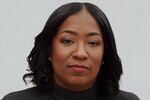
Brit Bennett, author of "The Vanishing Half"
Emma / OPB
On this episode of “Literary Arts: The Archive Project,” we feature the novelist Brit Bennett. Brit Bennett exploded onto the literary stage in 2016 with her novel, “The Mothers.” In her New York Times review, Mira Jacob praised the novel as a “ferociously moving debut.” Critics also noted Bennett’s talent for creating both propulsive, page-turning plots, and enduring, complex characters that stay with the reader long after the final page. Expectations were accordingly high for her second novel, and Bennett delivered in 2020 with “The Vanishing Half.” It became an immediate bestseller and earned Bennett comparisons to Toni Morrison, James Baldwin, and Elizabeth Strout.
Both novels share a focus on the complicated dynamics of family, and on the social and political influence of small-town communities. They are also explicitly centered on secrets, on roads not taken and what ifs.
Bennett joined us for Portland Arts and Lectures on February 17, 2022 to talk about “The Vanishing Half” and how and why she came to write it, and specifically why she wanted to write a novel in which one of the primary characters passes for white. Bennett dives into the literary history of stories about passing from the beginning of the 20th century through the present and provides a fresh perspective on the central American themes in fiction: the creative and destructive power of personal transformation.
Bio:
Born and raised in Southern California, Brit Bennett graduated from Stanford University and later earned her MFA in fiction at the University of Michigan. Her debut novel, “The Mothers,” was a New York Times bestseller and a finalist for both the NBCC John Leonard First Novel Prize and the PEN/Robert W. Bingham Prize for Debut Fiction. Her second novel, “The Vanishing Half,” was an instant #1 New York Times bestseller, longlisted for the National Book Award, a finalist for the Women’s Prize, and named one of the ten best books of the year by The New York Times. Bennet has been named a National Book Foundation 5 Under 35 honoree, a NAACP Image Award Finalist, and one of Time’s Next 100 Influential People. Her essays have been featured in The New Yorker, The New York Times Magazine, The Paris Review, and Jezebel.
